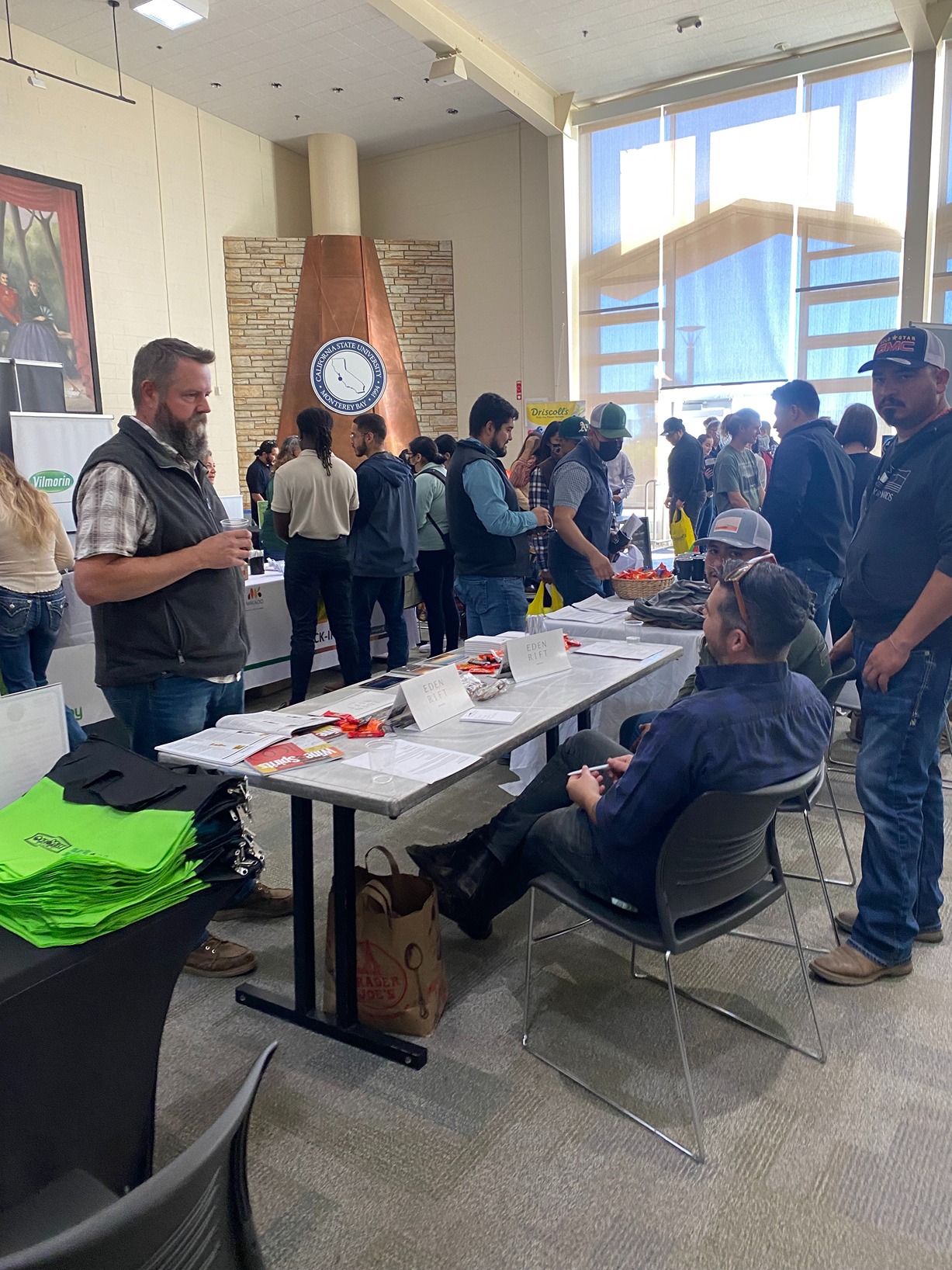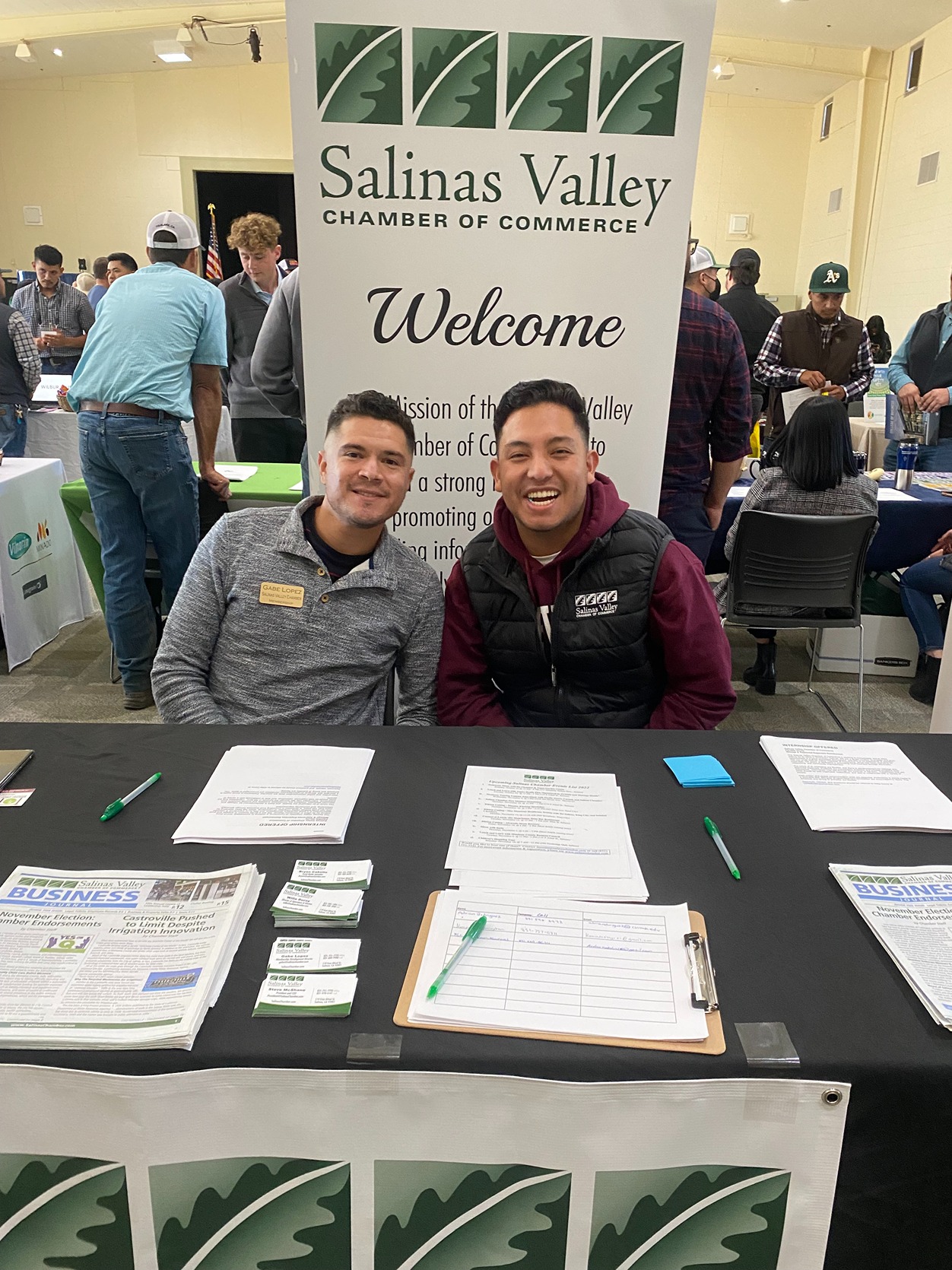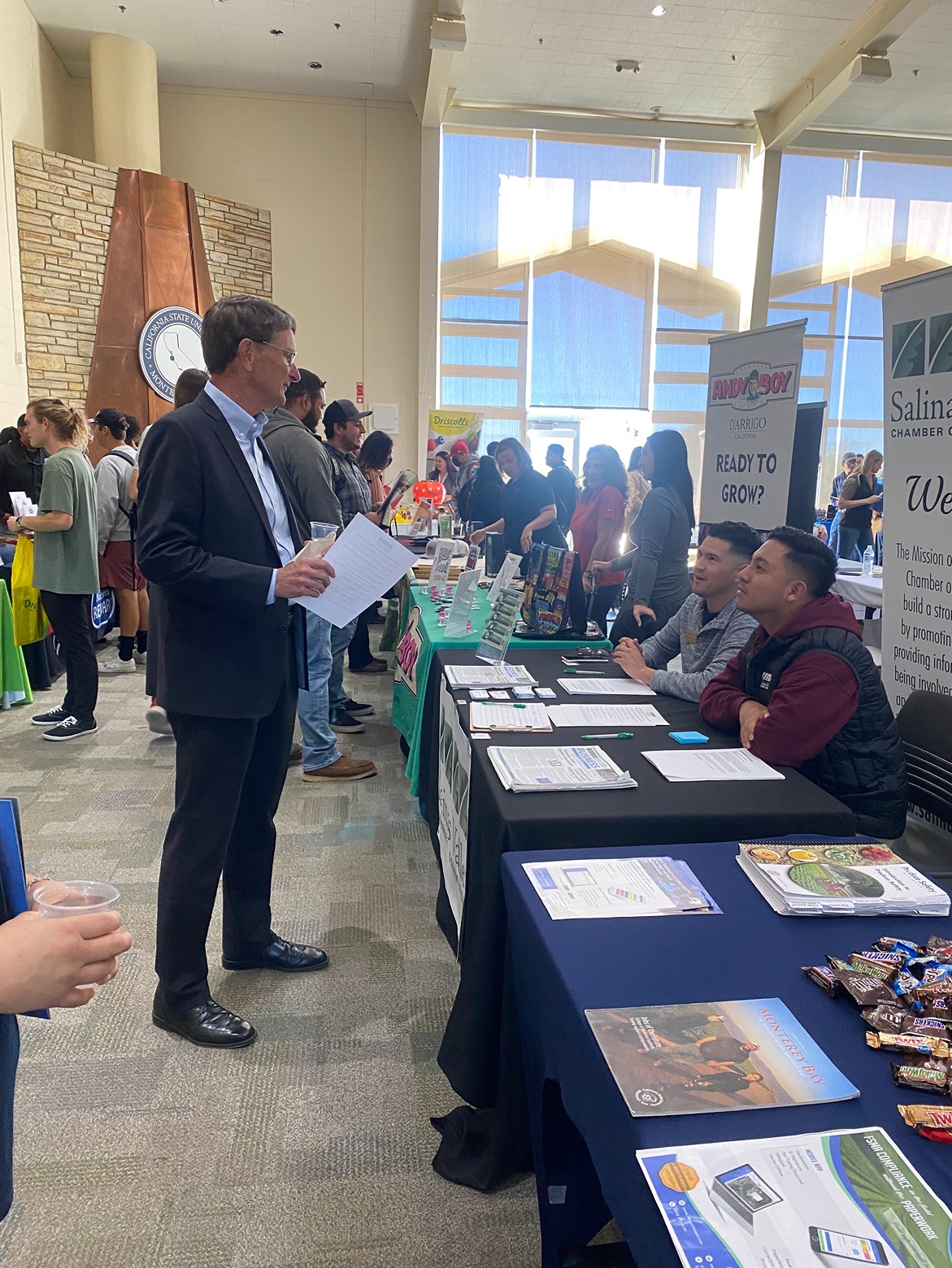Greater Vision 2022: Push, Pull, Panic? Perishable Supply Chain Management
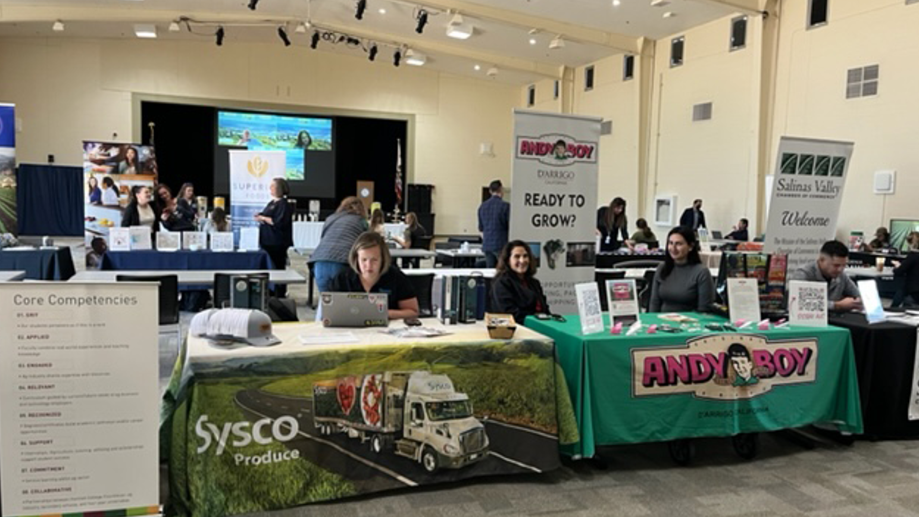
Twenty-five vendors watched the Greater Vision live webinar as they prepared to meet students at the post-event career fair.
By Lisa Dobbins
November 4, 2022 – Supply chains have been in the news since the start of the COVID-19 pandemic in March of 2020. But what exactly is meant by “supply chain”? And how are perishable goods, like fruits and vegetables, affected when supply chains are slowed or interrupted? What special challenges does the Agriculture industry face, and how can vulnerabilities be mitigated?
At the 16th Annual Greater Vision on October 24th, CSUMB President Vanya Quiñones welcomed an audience of over 200 CSUMB and community college students, faculty, staff, and ag industry employers and organizations. Master of Ceremonies Dennis Donohue followed with an overview of the agenda and an introduction to keynote speaker Kevin Murphy.
Keynote: What is the Perishable Supply Chain And How Is It Managed?
Keynote speaker Kevin Murphy shared his insights into the supply chain for perishable goods as a critical element with unique and ongoing challenges for the Ag Industry. Kevin is chairman of the board for Ocean Mist Farms, former CEO of Driscoll’s, and advisor to the produce industry. He is also a member of the development committee for CSUMB’s Agribusiness Supply Chain Management Degree Program.
Kevin defined supply chains as “a network of individuals and companies involved in creating a product and delivering it to consumers.” He explained that every effort to move goods from production to the customer has unique and complex interdependencies. Recently, customer demand for product delivery has emerged as the next opportunity for competitive advantage. Some sources of the breakdown in supply chain management that began before the pandemic included the reliance on China for goods, the decline in the trucking industry due to a lack of drivers, and the shortage of shipping containers to bring goods and raw materials across the globe. The pandemic accelerated the breakdown of the supply chain by causing volatility in markets due to the radical shifts in consumer purchasing and scarcity of materials from overseas. Kevin projected that supply chains need to evolve from “just in time” to “just in case.” He concluded by pointing to the abundant career opportunities in supply chain management in areas such as logistics, retail, purchasing, and operations. CSUMB and community college students can take advantage of these opportunities by developing data analytics skills, training in various assessment tools, and learning how to prioritize, plan and organize. Kevin noted that CSUMB’s new Agribusiness Supply Chain Management major will be the first in the nation to provide a degree specifically geared towards developing talent to fill the growing number of career positions in supply chain management in the agriculture industry.
Panel Discussion #1: Supply Chains In Action
The keynote was followed by the first panel discussion, “Supply Chains In Action.” The moderator, Tom Shepherd, is the former Vice President of Logistics at Driscoll's and former Vice President of Operations & Supply Chain Management at Fresh Express. Tom shared that supply chains are mostly invisible, but disruptions do get people’s attention. He pointed to the need to focus on agility and consumer needs to address the problems caused by disruptions and asked panelists to share examples of supply chain disruptions. Matt Amaral, Vice President of Post Harvest, gave two examples. His first example was how the pandemic caused the agriculture industry, deemed an “essential business,” to ensure that health and safety protocols were implemented immediately. In his second example, Matt told the story of how D’Arrigo California helped keep goods moving for industry partner Taylor Farms when a local processing facility had a devastating fire.
Panelist Sandor Nagy, Chief Operating Officer at Driscoll's, also shared two examples. During the pandemic, one of Driscoll’s largest direct customers had a COVID-19 outbreak in their distribution center. Driscoll’s had to pivot to deliver directly to the stores. Another example was the disruption of global distribution networks with airplanes and ships stranded. Driscoll’s had to charter freight lines directly to continue to ship goods. Time, temperature, and food safety are key to maintaining quality in the supply chain. Matt added, “Forecasting is critical with the wildcard being the weather.” Production departments plan a year out, and planning for contingencies is vital. Traceability is another crucial element that is increasingly important. As for careers, Tom mentioned the widening gap between the work today and the talent needed in the future. There must be a corporate commitment and a design network for the whole supply chain with qualified people to run it. Technology is key to all aspects of the supply chain. Ag companies are looking for people with data science, analytics, and a passion for sustainability. Matt concluded by saying that supply chains touch so many levels of the ag business you can become an invaluable leader in operations with expertise in supply chain management.
Panel Discussion #2: Supply Chain Skills and Opportunities
Dennis Donohue, Director of Western Growers Center for Innovation and Technology, kicked off the second discussion by asking panelists what led them to take on their current roles as ag industry innovators. Diane Wetherington, Founder & CEO of iDecision Sciences, LLC, spent most of her career in supply chain management, beginning as a product forecaster. When an E-Coli outbreak in spinach occurred in 2006, she consulted on solutions and saw the need for software tools to trace product.
Martha Montoya, Founder & CEO of Ag Tools, worked as a child assisting her family businesses on global shipments. She has been in logistics her whole life. She saw the need to have real-time data serve an understanding of global markets.
Diane commented, "Data is important when you want to know where the product is and how safe it is. But it is more than that. It is everything from buying, growing, transportation, distribution, and beyond. Data serves decision-making. Data is evolving, and we need tech systems and practitioners that evolve with it.” Martha suggested, “We need a new era of young people to be the building blocks for the future of the industry.” She mentioned that young people entering the field shouldn’t settle for old ways of doing things. Developing knowledge of the ag industry takes time as does learning technical skills.
Diane and Martha shared valuable advice for students interested in careers in ag. Students should be ready to learn, seek mentors, and sign up for an internship. Martha said, “We need young people coming up with solutions and then building it themselves.” Diane mentioned food safety as a good example of the evolution of a field in agriculture. In 2006, there were no food safety experts, and today there are Universities teaching food safety and top executives that run food safety divisions at companies. This is what is now needed in the field of supply chain management.
Students from CSUMB and community colleges from Santa Cruz, Monterey, and San Benito counties were invited to attend a career fair following the Greater Vision webinar that featured ag industry employers. The “Cultivating Talent & Harvesting Leaders Career & Internship Fair” was organized by JP Dundore-Arias, M.S., Ph.D., CSUMB College of Science Assistant Professor, and Rhonda Mercadal-Evans, Associate Director for CSUMB Advising, Career & Student Success. The career fair was produced through the support of a USDA grant (#2021-70001-34526), brought together over 25 agricultural companies and federal agencies, and was attended by students from across majors.
To learn more about how CSUMB’s College of Business is partnering with leading ag companies to address the evolving needs of the agricultural industry by developing the new Bachelor of Science degree program in Agribusiness Supply Chain Management, visit www.csumb.edu/ascm.
About the Author
Lisa Dobbins is the Executive Director of the Grower-Shipper Association Foundation and a key member of the Greater Vision event organizing committee.
Thank you to all who helped make this event a success!
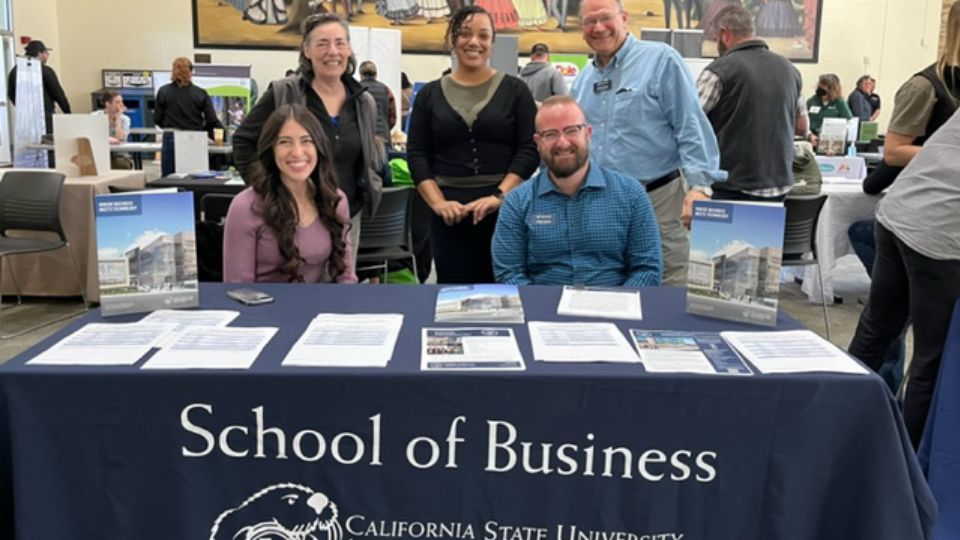
Staff and faculty from the College of Business
